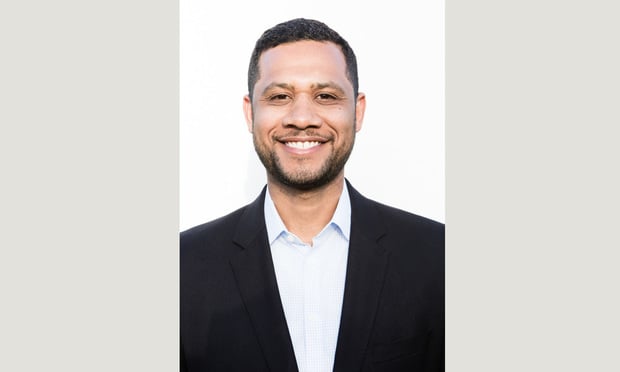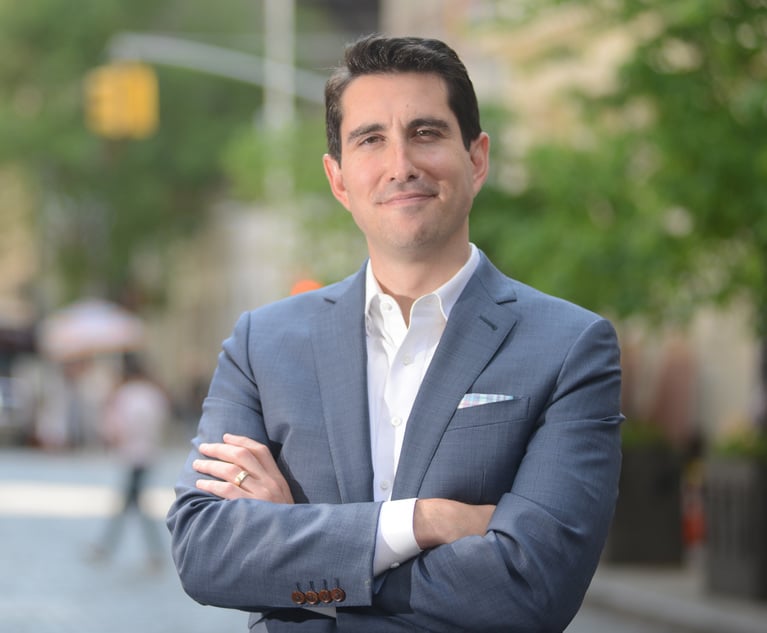Creating a Diverse and Welcoming Legal Department: A Q&A With Ironclad's Chris Young
"What we're looking for is someone who can come in and contribute beyond their resume and school. What are some of the intangible elements of a strong team member? That's what we look for and that usually means we get some diverse pool of finalists."
January 30, 2020 at 03:01 PM
5 minute read
The original version of this story was published on Corporate Counsel
 Chris Young, general counsel of Ironclad Inc. Courtesy photo.
Chris Young, general counsel of Ironclad Inc. Courtesy photo.
In 2018, Chris Young was tasked with creating a legal department from scratch. He had just joined Ironclad Inc., a San Francisco-based digital contracting platform company. Starting with legal operations, he established a foundation for the department and learned about the importance of diversity, within the candidates and their skill sets.
Young spoke with The Recorder affiliate Corporate Counsel to discuss what goes into creating a rewarding legal department, the importance of legal operations, and diversity and inclusion.
This conversation has been edited for length and clarity.
Corporate Counsel: What are some steps you've taken to make the legal department a welcoming place to work?
Chris Young: One of the things that I focused on is laying an operational foundation before hiring top-talent lawyers. The first two hires I made in the legal department were not actually lawyers but rather legal operations professionals. I wanted to bring in two folks to focus on how we're going to build and then run a legal department.
We wanted to set our policies and our systems up so that when talent came in they could hit the ground running and focus on the impactful legal work that lawyers really enjoy. We want to be forward-thinking and advance the mission of the legal department and the mission of the entire organization.
It was very important to me to be able to set up an organization where lawyers are able to come in and, much like in a law firm, have the support and the processes in place necessary for them to lift up from this administrative work and focus on the intellectually appealing work.
CC: Is part of that work having in-house counsel become more involved with the different business units?
CY: When I was coming up, in-house lawyers were seen as lawyers who could not make partner so they went in-house. That is no longer the case. We're seeing top talent from top-tier firms coming in-house. You don't typically join a startup or a company, in-house, just to be a lawyer. You join to become a businessperson and to learn about a business. I continue to believe that lawyers have the skill set you develop as a law student. That has a tremendous amount of potential to impact the business that is well beyond what you would expect of an attorney.
It is absolutely critical, in my opinion, that legal is a shared resource and we partner very closely with every single department. So that not only can we establish that relationship but we can foster that relationship and be seen as enablers and strategic business partners.
CC: Ironclad boasts that 75% of its executive team is from a minority group and a 50-50 gender split companywide. What do you do to promote diversity and inclusion in the legal department?
CY: I've spent most of my career caring about diversity. I don't think it's rocket science. I think there are ways to build a diverse organization either intentionally or you attract diverse candidates because of who you are. We are in the latter category.
I'm in the process of making a key hire to our legal team. We've had the great fortune of having over 50 qualified applicants. When you're going through that process, one is inclined to look for candidates who are kind of like them. If you're a legal executive, it's more likely that you come from a fancy law school or some type of background that doesn't lend itself to diversity.
The exercise we're going through is not focusing on an applicant's pedigree, which is an easy thing to do, not only for law firms but for in-house leaders who are building their respective teams. What we're looking for is someone who can come in and contribute beyond their resume and school. What are some of the intangible elements of a strong team member? That's what we look for and that usually means we get some diverse pool of finalists. I'll say that we're not in the business of filling slots.
CC: Is the practice of checking boxes and filling certain slots antithetical to diversity and inclusion?
CY: Right. Diversity at Ironclad is something we care a deal about. We are trying to bring in people who we believe fit well with our culture and the output and the result of that is having an incredibly diverse set of people who are building and running this company.
It really is from the top down. People talk about diversity for all kinds of reasons. I think that you need a diverse workforce to be creative. It's not just creativity and everyone feeling like they have a say. It's also just a more interesting place to work.
This content has been archived. It is available through our partners, LexisNexis® and Bloomberg Law.
To view this content, please continue to their sites.
Not a Lexis Subscriber?
Subscribe Now
Not a Bloomberg Law Subscriber?
Subscribe Now
NOT FOR REPRINT
© 2025 ALM Global, LLC, All Rights Reserved. Request academic re-use from www.copyright.com. All other uses, submit a request to [email protected]. For more information visit Asset & Logo Licensing.
You Might Like
View All
Kraken’s Chief Legal Officer Exits, Eyes Role in Trump Administration
3 minute read

Collectible Maker Funko Wins Motion to Dismiss Securities Class Action

How Tony West Used Transparency to Reform Uber's Toxic Culture
Trending Stories
- 1States Accuse Trump of Thwarting Court's Funding Restoration Order
- 2Microsoft Becomes Latest Tech Company to Face Claims of Stealing Marketing Commissions From Influencers
- 3Coral Gables Attorney Busted for Stalking Lawyer
- 4Trump's DOJ Delays Releasing Jan. 6 FBI Agents List Under Consent Order
- 5Securities Report Says That 2024 Settlements Passed a Total of $5.2B
Who Got The Work
J. Brugh Lower of Gibbons has entered an appearance for industrial equipment supplier Devco Corporation in a pending trademark infringement lawsuit. The suit, accusing the defendant of selling knock-off Graco products, was filed Dec. 18 in New Jersey District Court by Rivkin Radler on behalf of Graco Inc. and Graco Minnesota. The case, assigned to U.S. District Judge Zahid N. Quraishi, is 3:24-cv-11294, Graco Inc. et al v. Devco Corporation.
Who Got The Work
Rebecca Maller-Stein and Kent A. Yalowitz of Arnold & Porter Kaye Scholer have entered their appearances for Hanaco Venture Capital and its executives, Lior Prosor and David Frankel, in a pending securities lawsuit. The action, filed on Dec. 24 in New York Southern District Court by Zell, Aron & Co. on behalf of Goldeneye Advisors, accuses the defendants of negligently and fraudulently managing the plaintiff's $1 million investment. The case, assigned to U.S. District Judge Vernon S. Broderick, is 1:24-cv-09918, Goldeneye Advisors, LLC v. Hanaco Venture Capital, Ltd. et al.
Who Got The Work
Attorneys from A&O Shearman has stepped in as defense counsel for Toronto-Dominion Bank and other defendants in a pending securities class action. The suit, filed Dec. 11 in New York Southern District Court by Bleichmar Fonti & Auld, accuses the defendants of concealing the bank's 'pervasive' deficiencies in regards to its compliance with the Bank Secrecy Act and the quality of its anti-money laundering controls. The case, assigned to U.S. District Judge Arun Subramanian, is 1:24-cv-09445, Gonzalez v. The Toronto-Dominion Bank et al.
Who Got The Work
Crown Castle International, a Pennsylvania company providing shared communications infrastructure, has turned to Luke D. Wolf of Gordon Rees Scully Mansukhani to fend off a pending breach-of-contract lawsuit. The court action, filed Nov. 25 in Michigan Eastern District Court by Hooper Hathaway PC on behalf of The Town Residences LLC, accuses Crown Castle of failing to transfer approximately $30,000 in utility payments from T-Mobile in breach of a roof-top lease and assignment agreement. The case, assigned to U.S. District Judge Susan K. Declercq, is 2:24-cv-13131, The Town Residences LLC v. T-Mobile US, Inc. et al.
Who Got The Work
Wilfred P. Coronato and Daniel M. Schwartz of McCarter & English have stepped in as defense counsel to Electrolux Home Products Inc. in a pending product liability lawsuit. The court action, filed Nov. 26 in New York Eastern District Court by Poulos Lopiccolo PC and Nagel Rice LLP on behalf of David Stern, alleges that the defendant's refrigerators’ drawers and shelving repeatedly break and fall apart within months after purchase. The case, assigned to U.S. District Judge Joan M. Azrack, is 2:24-cv-08204, Stern v. Electrolux Home Products, Inc.
Featured Firms
Law Offices of Gary Martin Hays & Associates, P.C.
(470) 294-1674
Law Offices of Mark E. Salomone
(857) 444-6468
Smith & Hassler
(713) 739-1250






